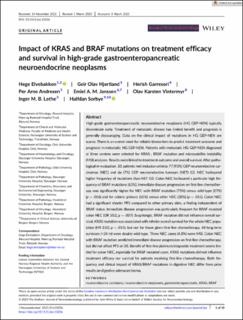| dc.contributor.author | Elvebakken, Hege | |
| dc.contributor.author | Hjortland, Geir Olav | |
| dc.contributor.author | Garresori, Herish | |
| dc.contributor.author | Andresen, Per Arne | |
| dc.contributor.author | Janssen, Emiel | |
| dc.contributor.author | Vintermyr, Olav Karsten | |
| dc.contributor.author | Lothe, Inger Marie Bowitz | |
| dc.contributor.author | Sorbye, Halfdan | |
| dc.date.accessioned | 2024-04-24T09:30:37Z | |
| dc.date.available | 2024-04-24T09:30:37Z | |
| dc.date.created | 2023-04-20T13:20:19Z | |
| dc.date.issued | 2023 | |
| dc.identifier.citation | Elvebakken, H., Hjortland, G. O., Garresori, H., Andresen, P. A., Janssen, E. A., Vintermyr, O. K., ... & Sorbye, H. (2023). Impact of KRAS and BRAF mutations on treatment efficacy and survival in high‐grade gastroenteropancreatic neuroendocrine neoplasms. Journal of Neuroendocrinology, 35(4), e13256. | en_US |
| dc.identifier.issn | 0953-8194 | |
| dc.identifier.uri | https://hdl.handle.net/11250/3127895 | |
| dc.description.abstract | High-grade gastroenteropancreatic neuroendocrine neoplasms (HG GEP-NEN) typically disseminate early. Treatment of metastatic disease has limited benefit and prognosis is generally discouraging. Data on the clinical impact of mutations in HG GEP-NEN are scarce. There is an unmet need for reliable biomarkers to predict treatment outcome and prognosis in metastatic HG GEP-NEN. Patients with metastatic HG GEP-NEN diagnosed at three centres were selected for KRAS-, BRAF mutation and microsatellite instability (MSI) analyses. Results were linked to treatment outcome and overall survival. After pathological re-evaluation, 83 patients met inclusion criteria: 77 (93%) GEP neuroendocrine carcinomas (NEC) and six (7%) GEP neuroendocrine tumours (NET) G3. NEC harboured higher frequency of mutations than NET G3. Colon NEC harboured a particular high frequency of BRAF mutations (63%). Immediate disease progression on first-line chemotherapy was significantly higher for NEC with BRAF mutation (73%) versus wild-type (27%) (p = .016) and for colonic primary (65%) versus other NEC (28%) (p = .011). Colon NEC had a significant shorter PFS compared to other primary sites, a finding independent of BRAF status. Immediate disease progression was particularly frequent for BRAF mutated colon NEC (OR 10.2, p = .007). Surprisingly, BRAF mutation did not influence overall survival. KRAS mutation was associatedwith inferior overall survival for the wholeNEC population (HR 2.02, p = .015), but not for those given first-line chemotherapy. All long-term survivors (>24 m) were double wild-type. Three NEC cases (4.8%) were MSI. Colon NEC with BRAF mutation predicted immediate disease progression on first-line chemotherapy, but did not affect PFS or OS. Benefit of first-line platinum/etoposide treatment seems limited for colon NEC, especially for BRAF mutated cases. KRAS mutations did not influence treatment efficacy nor survival for patients receiving first-line chemotherapy. Both frequency and clinical impact of KRAS/BRAF mutations in digestive NEC differ from prior results on digestive adenocarcinoma. | en_US |
| dc.language.iso | eng | en_US |
| dc.publisher | Wiley | en_US |
| dc.relation.uri | https://onlinelibrary.wiley.com/doi/epdf/10.1111/jne.13256 | |
| dc.rights | Navngivelse 4.0 Internasjonal | * |
| dc.rights.uri | http://creativecommons.org/licenses/by/4.0/deed.no | * |
| dc.title | Impact of KRAS and BRAF mutations on treatment efficacy and survival in high-grade gastroenteropancreatic neuroendocrine neoplasms | en_US |
| dc.type | Peer reviewed | en_US |
| dc.type | Journal article | en_US |
| dc.description.version | publishedVersion | en_US |
| dc.rights.holder | The authors | en_US |
| dc.subject.nsi | VDP::Medisinske Fag: 700 | en_US |
| dc.source.pagenumber | 1-10 | en_US |
| dc.source.volume | 35 | en_US |
| dc.source.journal | Journal of neuroendocrinology | en_US |
| dc.source.issue | 4 | en_US |
| dc.identifier.doi | 10.1111/jne.13256 | |
| dc.identifier.cristin | 2142164 | |
| cristin.ispublished | true | |
| cristin.fulltext | original | |
| cristin.qualitycode | 1 | |

